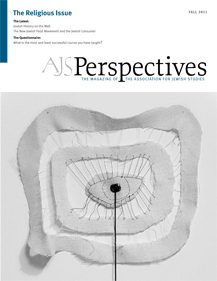Dear Colleagues,
The Religious Issue proved too subjective for a joint text, so this letter comes to you from only one of the editors. Somehow, the personal nature of religion puts individual belief right on the line.
I have always believed that at moments of complete elation or deep suffering, one encounters God and that, the rest of the time, she can be sustained by these memories. This goes along with (or is caused by) belief in the God of Israel and the Jewish religion. I have not known doubt or experienced a radical change in my religious behavior. Some, with more antiquated ideas of denominationalism, would even call me religious.
At the same time, I have always had an innate aversion to piety. To me, pious words empty out religious ideas. Proscriptions equally trigger my resistance. This disregard for piety comes with an affinity for secular and atheist Jews. When a Jew says that he is an atheist, it is my instinct to respond, "How Jewish." Such positions seem perfectly natural to me and to my sense of Judaism. This kind of Jewish doubt has led to the sort of intellectual and theoretical movements that excite me.
Having treated genius and doubt in the Secular Issue, we here explore the Religious Issue and its meanings in the contemporary world. The result thrills as it explores what (or who) stands between the self and the divine. If indeed something distances or mediates between the self and the divine, then we must ask what defines the self and the divine. What rhetoric and practices shape them? What relevance do the categories of self and divine carry? What is the nature of Judaism in past and current historical moments?
Our authors ask all of the above as they look inward at religion and the self. Language, practice, definition, apostasy, race, gender, transcendence, and the very concept of Religious Studies all appear to impact the religious self.
Rachel Havrelock
University of Illinois at Chicago

